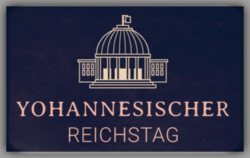Realm Parliament
| Part of a series on Rule of Law (Yohannes) |
|---|
 |
The Realm Parliament is the unicameral legislature of Yohannes. The Limited Separation of Powers, which established the Electoral College in 1781, and thus created the Parliament of the Nineteen Countries, used the term "Imperial Parliament" rather than "Parliament." Parliament and "Realm Parliament," however, soon came into popular usage, and in latter years especially have been used as a lazy shorthand term for both the institutions of the Electoral College and the Realm (archaic: "Imperial") Parliament. Not until the First Amendment came into force on 5 August 1861 did "Parliament" also become an official constitutional term.
Parliament today, broadly speaking, consists of the Assembly of Electors in the Nineteen Countries (Collegian Electors of the Nation State) and the Realm Parliament (Members of the Realm Parliament) itself. The role of the President of the Electoral College, who is also the elected Yohannesian Emperor at the same time, is purely formal. She or he is constantly absent from the Chamber of Electors to fulfill their executive duties and obligations as chief supervisor of the Executive Council. The real business of Parliament is carried out by the elected Realm Parliament, with members of the Electoral College themselves often attending the Realm Parliament's meetings to voice their views on day-to-day state matters. The functions of Parliament are to enact laws; to provide an Executive Council (i.e. federal government); to vote for departmental Appropriations (e.g. supplying money); and to examine the way the money is spent. Most importantly, Parliament also serves as the highest debating chamber in the land on public issues, and has the ultimate authority to redress citizens' grievances on petitions.
Personalised proportional representation
The first recorded general election took place for over six months in 1786, in time for Parliament to establish its first Act. The Foreign Mission Act 1787 sent 350 Yohannesian academics and aldermen abroad to observe Western economic, political and legal cultures. Because of the urgency of the Act, the voting process involved was poor compared to today's standards. The Realm Electoral Act 1871, amended further in 1939 and 1990, laid the foundations for the subsequent development of Parliament's modern-day standardised decision-making procedures.
There are 19 "constituent countries" or states in Yohannes. Each country undertakes general election with their own electoral system. To provide an Executive Council—that is, government at the federal level—however, there were two sets of rules used before the adoption of contemporary Yohannes' electoral system: the first and for the longest time, the first-past-the-post (FPP), and the second unofficially brief system, mixed-member proportional (MMP).
The first-past-the-post was adopted from the Constitution of Maxtopia and other industrialised countries at the time. It was a widely used electoral system in the Western world and some civilised countries in the Orient. Besides these, Yohannesian academics and technical supervisors were also sent to other major regions, such as the North Pacific, the East Pacific and Balder.
Under FPP, the candidate who secured the highest number of votes in their electorate would become a Member of Parliament (MP). Some larger urban zones in Yohannes also had multi-member electorates to reflect their high population density. In a multi-member electorate, more than one candidate would be selected to become an MP. The FPP and multi-member electorate systems were used until the 1988 referendum and the subsequent 1990 parliamentary election. Thereafter, the MMP system became the prescriptive electoral rules.
MMP was also an adopted foreign system. It allowed for two types of members: Electoral and Listed. An Electoral member is the candidate who had the largest number of votes in their electorate. A Listed member is the candidate who had been chosen by their political party. MMP was an unofficial temporary replacement, intended to make way for the introduction of an indigenous system developed in Yohannes—an offshoot of the personalised proportional representation system (PPR).
Adopted since the 1998 parliamentary election, the PPR is the set of rules used in modern-day Yohannes. It combines features of the widely used FPP and MMP systems to create a specialised system more in line with the Nineteen Countries' laws and national spirits. It was also created to support the central agenda of the government at the time: the slow but steady growth of Yohannes' trade, commerce and industry.
Similar to MMP, the Yohannesian offshoot of PPR was designed to ensure that the make-up of the legislature would reflect the make-up of the population, such as by looking at a voter's political allegiance, race or religion. PPR meant a registered voter could vote twice in the general election: first, for a candidate from their electorate, and then for the political party they so desired. The electoral candidate chosen who has secured the highest number of votes will become an Electoral member. The second vote for the political party allows for the entry of Listed parliamentary members, so chosen by their respective parties' leaders.

